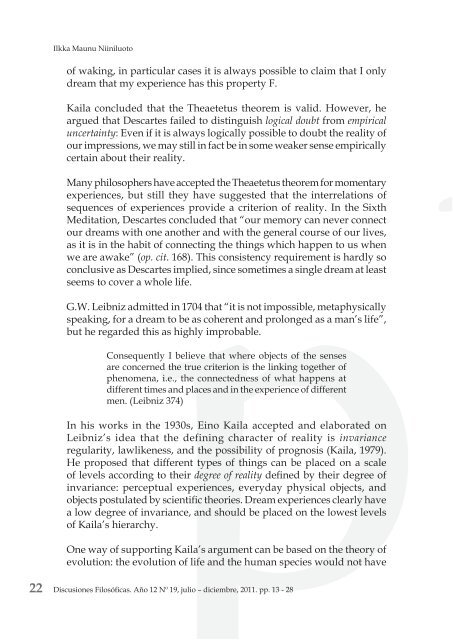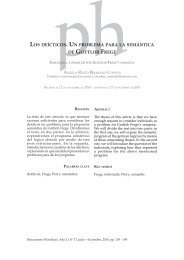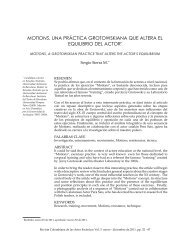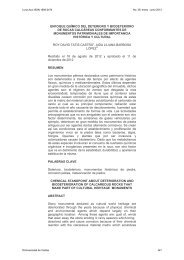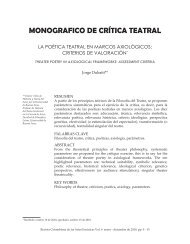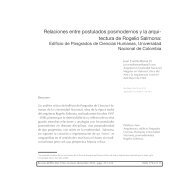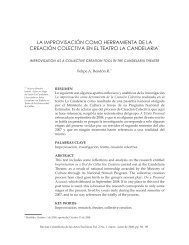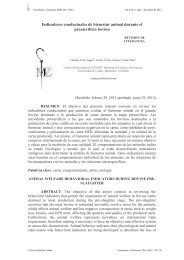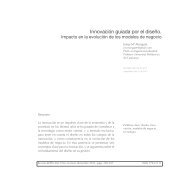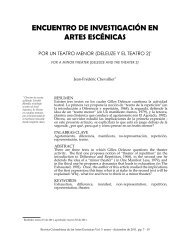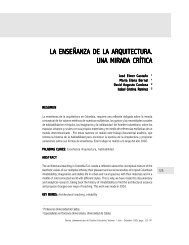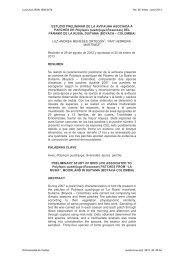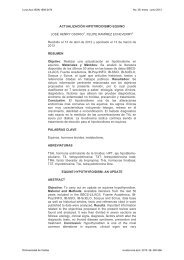- Page 1 and 2: Manizales - Colombia Año 12 No. 19
- Page 3: comité técnico De apoyo a la eDic
- Page 6 and 7: la teorización FilosóFica sobre l
- Page 11: Discusiones FilosóFicas
- Page 14 and 15: Ilkka Maunu Niiniluoto What is Virt
- Page 16 and 17: Ilkka Maunu Niiniluoto eliminate Wo
- Page 18 and 19: Ilkka Maunu Niiniluoto in World 1.
- Page 20 and 21: Ilkka Maunu Niiniluoto Some philoso
- Page 24 and 25: Ilkka Maunu Niiniluoto perceptions,
- Page 26 and 27: Ilkka Maunu Niiniluoto Virtual Real
- Page 28 and 29: Ilkka Maunu Niiniluoto Popper, K. R
- Page 30 and 31: David J. Chalmers Introduction Cons
- Page 32 and 33: David J. Chalmers but there is also
- Page 34 and 35: David J. Chalmers computational mec
- Page 36 and 37: David J. Chalmers methods have been
- Page 38 and 39: David J. Chalmers a host of special
- Page 40 and 41: David J. Chalmers discriminations m
- Page 42 and 43: David J. Chalmers At the end of the
- Page 44 and 45: David J. Chalmers theory altogether
- Page 46 and 47: David J. Chalmers If this view is r
- Page 48 and 49: David J. Chalmers In what follows,
- Page 50 and 51: David J. Chalmers It is this isomor
- Page 52 and 53: David J. Chalmers Very briefly: sup
- Page 54 and 55: David J. Chalmers when there is a s
- Page 56 and 57: David J. Chalmers is left with a wo
- Page 58 and 59: David J. Chalmers Jackendoff, R. Co
- Page 61 and 62: esumen La idea de la verosimilitud
- Page 63 and 64: VERISImILITuDE metaphysics is a sta
- Page 65 and 66: VERISImILITuDE says, and a useless
- Page 67 and 68: VERISImILITuDE aid of empirical inf
- Page 69 and 70: Science and specific metaphysics in
- Page 71 and 72: VERISImILITuDE revealed in full - t
- Page 73 and 74:
VERISImILITuDE Even Niiniluoto appr
- Page 75 and 76:
VERISImILITuDE success: the large s
- Page 77 and 78:
VERISImILITuDE had to change his op
- Page 79 and 80:
VERISImILITuDE offered by Niiniluot
- Page 81 and 82:
and or, perhaps, ver(E, e) > ver(N,
- Page 83 and 84:
VERISImILITuDE test. The most drama
- Page 85 and 86:
VERISImILITuDE narrated here, of co
- Page 87 and 88:
are there ValiD instances oF the Fa
- Page 89 and 90:
ARE ThERE VALID INSTANCES Of ThE fA
- Page 91 and 92:
ARE ThERE VALID INSTANCES Of ThE fA
- Page 93 and 94:
ARE ThERE VALID INSTANCES Of ThE fA
- Page 95 and 96:
ARE ThERE VALID INSTANCES Of ThE fA
- Page 97:
ARE ThERE VALID INSTANCES Of ThE fA
- Page 100 and 101:
Edgar Eslava Introduction In an exc
- Page 102 and 103:
Edgar Eslava could be that the hypo
- Page 104 and 105:
Edgar Eslava Maimonides teaches the
- Page 106 and 107:
Edgar Eslava have confused readers
- Page 108 and 109:
Edgar Eslava eternal matter. Finall
- Page 110 and 111:
Edgar Eslava same thing, then, is c
- Page 113 and 114:
¿pueDe la ciencia DeciDir el resul
- Page 115 and 116:
¿PuEDE LA CIENCIA DECIDIR EL RESuL
- Page 117 and 118:
¿PuEDE LA CIENCIA DECIDIR EL RESuL
- Page 119 and 120:
¿PuEDE LA CIENCIA DECIDIR EL RESuL
- Page 121 and 122:
¿PuEDE LA CIENCIA DECIDIR EL RESuL
- Page 123 and 124:
¿PuEDE LA CIENCIA DECIDIR EL RESuL
- Page 125 and 126:
¿PuEDE LA CIENCIA DECIDIR EL RESuL
- Page 127 and 128:
¿PuEDE LA CIENCIA DECIDIR EL RESuL
- Page 129 and 130:
¿PuEDE LA CIENCIA DECIDIR EL RESuL
- Page 131 and 132:
la teorización FilosóFica sobre l
- Page 133 and 134:
LA TEORIzACIÓN fILOSÓfICA SObRE L
- Page 135 and 136:
LA TEORIzACIÓN fILOSÓfICA SObRE L
- Page 137 and 138:
LA TEORIzACIÓN fILOSÓfICA SObRE L
- Page 139 and 140:
LA TEORIzACIÓN fILOSÓfICA SObRE L
- Page 141 and 142:
LA TEORIzACIÓN fILOSÓfICA SObRE L
- Page 143 and 144:
LA TEORIzACIÓN fILOSÓfICA SObRE L
- Page 145 and 146:
LA TEORIzACIÓN fILOSÓfICA SObRE L
- Page 147 and 148:
LA TEORIzACIÓN fILOSÓfICA SObRE L
- Page 149 and 150:
LA TEORIzACIÓN fILOSÓfICA SObRE L
- Page 151 and 152:
LA TEORIzACIÓN fILOSÓfICA SObRE L
- Page 153 and 154:
LA TEORIzACIÓN fILOSÓfICA SObRE L
- Page 155 and 156:
un esbozo Del sistema epistemológi
- Page 157 and 158:
Naturalismo uN ESbOzO DEL SISTEmA E
- Page 159 and 160:
uN ESbOzO DEL SISTEmA EPISTEmOLÓGI
- Page 161 and 162:
uN ESbOzO DEL SISTEmA EPISTEmOLÓGI
- Page 163 and 164:
uN ESbOzO DEL SISTEmA EPISTEmOLÓGI
- Page 165 and 166:
Y la técnica es: uN ESbOzO DEL SIS
- Page 167 and 168:
Indeterminación de la referencia (
- Page 169 and 170:
uN ESbOzO DEL SISTEmA EPISTEmOLÓGI
- Page 171 and 172:
uN ESbOzO DEL SISTEmA EPISTEmOLÓGI
- Page 173 and 174:
uN ESbOzO DEL SISTEmA EPISTEmOLÓGI
- Page 175 and 176:
uN ESbOzO DEL SISTEmA EPISTEmOLÓGI
- Page 177 and 178:
uN ESbOzO DEL SISTEmA EPISTEmOLÓGI
- Page 179 and 180:
eFerencias bibliográFicas uN ESbOz
- Page 181 and 182:
igiDez, esencialismo y actualismo e
- Page 183 and 184:
RIGIDEz, ESENCIALISmO y ACTuALISmO
- Page 185 and 186:
RIGIDEz, ESENCIALISmO y ACTuALISmO
- Page 187 and 188:
RIGIDEz, ESENCIALISmO y ACTuALISmO
- Page 189 and 190:
RIGIDEz, ESENCIALISmO y ACTuALISmO
- Page 191 and 192:
RIGIDEz, ESENCIALISmO y ACTuALISmO
- Page 193 and 194:
RIGIDEz, ESENCIALISmO y ACTuALISmO
- Page 195 and 196:
RIGIDEz, ESENCIALISmO y ACTuALISmO
- Page 197 and 198:
RIGIDEz, ESENCIALISmO y ACTuALISmO
- Page 199 and 200:
uNA CRÍTICA PRAGMATISTA A LA FILOS
- Page 201 and 202:
uNA CRíTICA PRAGmATISTA A LA fILOS
- Page 203 and 204:
uNA CRíTICA PRAGmATISTA A LA fILOS
- Page 205 and 206:
uNA CRíTICA PRAGmATISTA A LA fILOS
- Page 207 and 208:
uNA CRíTICA PRAGmATISTA A LA fILOS
- Page 209 and 210:
uNA CRíTICA PRAGmATISTA A LA fILOS
- Page 211 and 212:
uNA CRíTICA PRAGmATISTA A LA fILOS
- Page 213 and 214:
uNA CRíTICA PRAGmATISTA A LA fILOS
- Page 215 and 216:
uNA CRíTICA PRAGmATISTA A LA fILOS
- Page 217 and 218:
uNA CRíTICA PRAGmATISTA A LA fILOS
- Page 219 and 220:
uNA CRíTICA PRAGmATISTA A LA fILOS
- Page 221 and 222:
entre la pluraliDaD y la uniVersali
- Page 223 and 224:
ENTRE LA PLuRALIDAD y LA uNIVERSALI
- Page 225 and 226:
ENTRE LA PLuRALIDAD y LA uNIVERSALI
- Page 227 and 228:
ENTRE LA PLuRALIDAD y LA uNIVERSALI
- Page 229 and 230:
ENTRE LA PLuRALIDAD y LA uNIVERSALI
- Page 231 and 232:
ENTRE LA PLuRALIDAD y LA uNIVERSALI
- Page 233 and 234:
ENTRE LA PLuRALIDAD y LA uNIVERSALI
- Page 235 and 236:
ENTRE LA PLuRALIDAD y LA uNIVERSALI
- Page 237 and 238:
eFerencias bibliográFicas ENTRE LA
- Page 239 and 240:
errores en la estrategia argumentat
- Page 241 and 242:
ERRORES EN LA ESTRATEGIA ARGumENTAT
- Page 243 and 244:
ERRORES EN LA ESTRATEGIA ARGumENTAT
- Page 245 and 246:
ERRORES EN LA ESTRATEGIA ARGumENTAT
- Page 247 and 248:
ERRORES EN LA ESTRATEGIA ARGumENTAT
- Page 249 and 250:
ERRORES EN LA ESTRATEGIA ARGumENTAT
- Page 251 and 252:
ERRORES EN LA ESTRATEGIA ARGumENTAT
- Page 253 and 254:
ERRORES EN LA ESTRATEGIA ARGumENTAT
- Page 255 and 256:
ERRORES EN LA ESTRATEGIA ARGumENTAT
- Page 257 and 258:
ironía, conocimiento y subjetiViDa
- Page 259 and 260:
IRONíA, CONOCImIENTO y SubjETIVIDA
- Page 261 and 262:
IRONíA, CONOCImIENTO y SubjETIVIDA
- Page 263 and 264:
IRONíA, CONOCImIENTO y SubjETIVIDA
- Page 265 and 266:
IRONíA, CONOCImIENTO y SubjETIVIDA
- Page 267 and 268:
IRONíA, CONOCImIENTO y SubjETIVIDA
- Page 269 and 270:
IRONíA, CONOCImIENTO y SubjETIVIDA
- Page 271 and 272:
IRONíA, CONOCImIENTO y SubjETIVIDA
- Page 273:
IRONíA, CONOCImIENTO y SubjETIVIDA
- Page 277 and 278:
esumen En este artículo se analiza
- Page 279 and 280:
Kripke’s fixed point construction
- Page 281 and 282:
READ ON ThE LIAR defined only on th
- Page 283 and 284:
(10) is equivalent with ¬∃x(x is
- Page 285 and 286:
READ ON ThE LIAR to the right-hand
- Page 287 and 288:
READ ON ThE LIAR Let us represent p
- Page 289 and 290:
READ ON ThE LIAR is infinitary): wh
- Page 291 and 292:
COLABORADORES Collaborators iKKa ma
- Page 293 and 294:
germán guerrero pino Licenciado en
- Page 295 and 296:
contribuciones son en lógica y, en
- Page 297 and 298:
guiDelines For potential contributo
- Page 299:
Nombre / Name Cédula / Identificat


